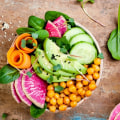Here are 7 nutrients you may need to supplement while following a vegan diet: vitamin B12. Foods that are often promoted as rich in vitamin B12 include unwashed organic products, mushrooms grown in vitamin B12-rich soils, nori, spirulina, chlorella, and nutritious yeast. Legumes, nuts, seeds, oats, bread, tempeh and miso are good vegetable sources of zinc. Without supplements, vegan diets provide approximately the dietary reference intakes (DRI) for zinc (see table below). It's easy to get protein from plants.
One of the most challenging aspects of following a vegan diet is ensuring that all your nutritional needs are met, despite eliminating major food groups from your diet. Following a vegan diet means eliminating all animal foods such as meat, poultry, eggs and dairy products. It can seem restrictive and also unhealthy without the right knowledge and resources at hand. Studies have shown that vegans tend to consume less vitamin B12, iron, calcium, vitamin D, omega-3 fatty acids and zinc compared to non-vegetarians, so it's important for vegans to identify vegan-friendly sources of these nutrients.
Zinc plays an important role in many cellular functions, including the immune system, wound healing, and growth and development. The high phytate content (found in grains, legumes, and seeds) in vegan diets decreases zinc absorption, making it much more important for vegans to include dietary sources of zinc in their diets. Try soaking and sprouting beans and grains to reduce their phytate content and maximize zinc absorption. For example, vegans are more likely to lack important nutrients such as vitamin B-12, zinc and calcium, each of which plays a vital role in the body.
Recent research has found that, on average, vegans consume only 10% to 20% of the recommended amount of vitamin B-12 each day. For vegans, it can be difficult to find foods rich in vitamin B-12, since it is found mainly in animal products. However, food manufacturers that serve plant-based consumers often add vitamin B-12 to their products, such as fortified breakfast cereals, nutritional yeast, non-dairy milk and tofu. Iron is a mineral that helps red blood cells carry oxygen from the lungs to the rest of the body.
It is also used to create certain hormones and helps brain development in children. Although iron is found in animal and vegetable food products, vegans need to consume almost twice the recommended daily amount than their carnivorous counterparts. This is because it's harder for the body to absorb iron from plant sources, known as non-heme iron. Iron is available in plant (non-heme) and animal (heme) sources.
Vegans can get their daily amount of iron by eating foods such as beans, tofu, fortified cereals, pumpkin seeds, nuts, spinach, broccoli, quinoa, nuts, and whole-grain pasta. Calcium is another mineral that helps essential body functions. It's important to note that calcium is important for bone health, blood flow, and hormone release. It also keeps your muscles and teeth strong.
Vegans often struggle to get enough calcium through diet alone, as it is found primarily in dairy products. The average American will consume most of the calcium from milk, cheese, and yogurt. Vegans will want to look for plant-based sources of calcium, such as chia seeds, soy milk, tofu, almonds, kale, broccoli and arugula. Unlike the other vitamins and minerals on this list, the body can produce vitamin D, but it needs sunlight to do so.
However, vitamin D deficiencies are very common, with 42% of American adults not eating the recommended daily allowance. Although vitamin D is found in certain foods such as fish and eggs, many of these foods are not compatible with vegan diets. As a result, people who do not consume meat may have difficulty meeting the suggested intake, unless they consume it in the form of vitamins or through direct exposure to the sun. In addition to receiving sunlight several times a week, vegans can also incorporate certain foods into their diet to get enough vitamin D.
These foods include mushrooms, fortified cereals, and fortified beverages such as orange juice, soy milk and rice milk. Zinc is an essential nutrient that facilitates several key functions, such as body development and growth, immune response, wound healing and blood clotting. Because your body can't produce or store zinc, it's important to look for zinc-rich foods or take supplements to reach your recommended daily intake. Unfortunately, most foods that contain zinc are not suitable for vegans, so people who follow plant-based diets tend to have lower levels of zinc than people who eat meat.
Animal products such as fish, poultry and meat are the most common sources of zinc. If you're vegan or vegetarian, you can get zinc from foods such as legumes, nuts, seeds, whole grains, mushrooms, kale and asparagus. Fatty and fatty fish such as salmon, herring and mackerel are the main sources of omega-3 fatty acids. But because they are not suitable for vegans, people who follow a plant-based diet can get the recommended daily intake of omega-3 from flaxseeds, chia seeds, hemp seeds, seaweed, walnuts, soybeans and Brussels sprouts.
Iodine is a mineral that the body uses to create thyroid hormones, which help metabolism and repair cells. It is found naturally in some foods, in soil, and is added to certain table salts. Around a third of the world's population is iodine deficient, and vegans are at greater risk than carnivores. Like most of the other minerals on this list, iodine is found primarily in animal products such as fish, eggs, and dairy products.
For vegans, iodine-rich options include seaweed, broad beans, plums, and iodized table salt. People who follow plant-based diets can get vitamin K1 from leafy greens and vegetables such as kale, spinach, kale, broccoli and Brussels sprouts. They can get vitamin K2 through fermented foods such as natto (a fermented soy dish), vegan sauerkraut, kimchi and dairy-free kefir. Unfortunately for vegans and vegetarians, the type of iron found in plant-based foods (non-heme iron) isn't as easily absorbed as the iron found in meat (heme iron).
There are fewer vegan-friendly foods that are naturally rich in vitamin K2, so vegans should be careful to get enough through supplements or fermented products. In general, adding vitamin C to meals increases iron absorption more than adding iron beyond the amount of iron in the foods that make up most vegan diets. A vegan diet is based on plants (such as vegetables, cereals, nuts and fruits) and on foods made with plants. You can get the nutrients you need by following a varied and balanced vegan diet, including fortified foods and supplements.
If you can't reach the suggested amount with food alone, you can consider taking vitamins and vegan supplements to increase your nutrient intake. You can get vegan sources of vitamin D through fortified foods and supplements, specially treated mushrooms, and sunlight on your skin. If you're raising your baby or child on a vegan diet, you need to make sure that they consume a wide variety of foods to provide them with the energy and vitamins they need to grow. .
.


